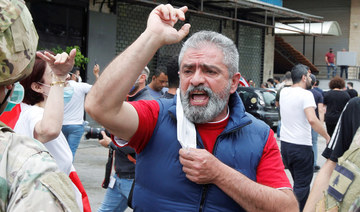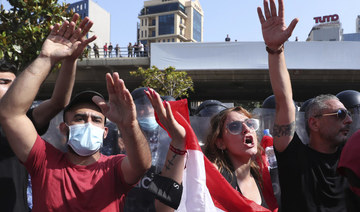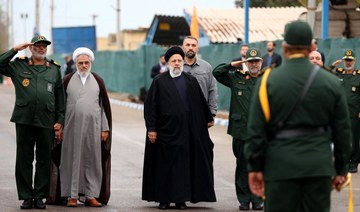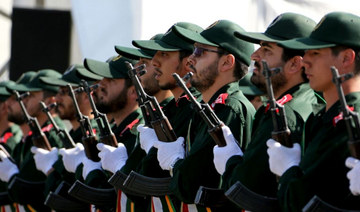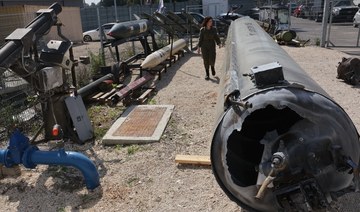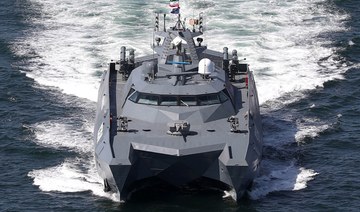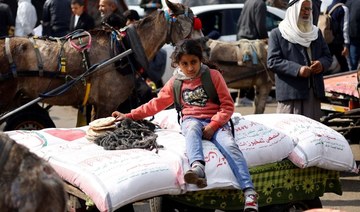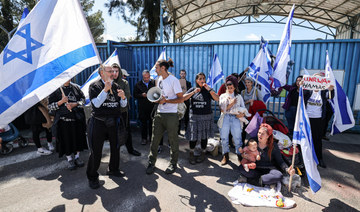BEIRUT: Following a night of violence, calm was restored in Beirut and other parts of Lebanon on Sunday, with the army warning against dragging the country into chaos that could endanger “national unity.”
Riots broke out in central Beirut and other areas after videos circulated on social media showing some supporters of the Amal Movement, and the Iranian-backed Hezbollah, chanting sectarian insults targeting revered religious figures.
The overnight violence left 25 soldiers injured. The Lebanese Army issued a statement vowing action against those who jeopardize the “state’s security.”
Riot police fired tear gas at protesters, after Saturday’s attempt to reboot anti-government demonstrations quickly degenerated into rioting and stone-throwing confrontations between opposing camps. Lebanese troops deployed to separate the rival groups, and the tensions eventually subsided before dawn on Sunday.
Protesters also called for Hezbollah’s disarmament. According to the army’s statement, seven people — four Syrians, one Palestinian and two Sudanese nationals — were arrested for rioting.
All political and religious parties unanimously condemned the sectarian incident and sought to contain the strife.
President Michel Aoun called on all political and religious leaders and citizens, who lived through the events of 1975-1976, to take all possible measures against such elements to ensure national cohesion.
Aoun warned: “Any security setback — if it occurs — will not be in anyone’s interest.”
The head of the Bar Association, Melhem Khalaf, said: “Were the 17 years of senseless fighting, 200,000 deaths and displacement of 1 million people was not enough?”
As people in the street and on social media expressed their anger and disgust at what happened during the civil protest, it was announced that a protest scheduled to take place on Sunday outside the US Embassy in Beirut had been canceled.
The protest, which was going to be organized by Hezbollah supporters, was to denounce US interference in Lebanon’s internal affairs.
Dr. Ziad Abdel Samad, researcher in development and public affairs, told Arab News: “Indeed, people are repulsed by what happened, but it will not prevent them from taking to the streets again to demand their rights.”
He said: “The movement that resumed on Saturday is a continuation of the Oct. 17 revolution. People are free to voice their demands. The majority raised economic slogans, and if some called for disarming Hezbollah, that does not mean they should be accused of treachery. Saturday’s demonstrations surprised the authorities, so they decided to respond with violence in which they reminded us that they can repeat what they did on May 7, 2008, when Hezbollah militarily seized control of Beirut after clashing with the Future Movement as well as the Progressive Socialist Party in Mount Lebanon. About 100 people were killed then.”
Abdel Samad added: “What happened on Saturday will not eliminate the civil movement, which is committed to its demands and to pressuring for the reestablishment of the authority by forming a government with powers that allow it to draft a new electoral law, as happened in Tunisia.”
He said: “The current government is unable to accomplish anything. Even the negotiation between the government and the International Monetary Fund were not serious. It seems as if the government, and especially Hezbollah, do not want to resort to this option to save the country’s economy. They want to resort to their choice: Iran. In this sense, Hezbollah does not care about Lebanon — either it takes control or the country gets burned down.”
Public affairs expert and activist Dr. Walid Fakhreddin told Arab News: “Hezbollah previously caused such tensions four or five times since the protests started on Oct. 17. However, this is the first time this happened under the government of Hassan Diab. This means that Diab’s government is in crisis, and this is Hezbollah’s way (of operating) when it does not want a government to continue.”
Fakhreddin added: “On the other hand, no one is ready to stand up to Hezbollah. I believe Diab’s government is unable to continue and will not manage to obtain funds to prevent economic collapse.”
He said whatever happened on Saturday was a response to the protesters’ demand to disarm Hezbollah “because another protest with this demand took place a few days ago outside the Palace of Justice in Beirut, and Hezbollah did not respond that time.”
He added: “I think Hezbollah was surprised that people took to the streets despite being intimidated and amid a pandemic.”
Political analyst Ghassan Hajjar, though, told Arab News: “What happened is new. It is not an extension of Oct. 17, but rather it will mark the start of a new stage.
“Hezbollah is in crisis more than ever because it believes the threat against it is increasing and has become direct. The civil movement is targeting Hezbollah by raising the demand for its disarmament. Hezbollah is afraid of what is introduced regionally by federations that are tearing apart the Iranian axis.
“No one won on Saturday — not the government, the Hezbollah nor the protesters. Everyone lost,” he added. “I do not think that toppling the Diab’s government needs these clashes. Bringing it down requires a political decision by Hezbollah. It is true that there is talk about a government change, but it will only happen if Hezbollah is convinced that Saad Hariri will return to head the government and control the Sunnis.
“Hariri’s return to the government is in the interest of the Free Patriotic Movement (FPM) after the losses it suffered as it does not have a Sunni cover, and the Shiite cover is not enough if the FPM considered the republic’s presidency. However, no agreement with Hariri has been reached.”
Lebanon overcomes sectarian strife as army declares zero tolerance
https://arab.news/px5z9
Lebanon overcomes sectarian strife as army declares zero tolerance
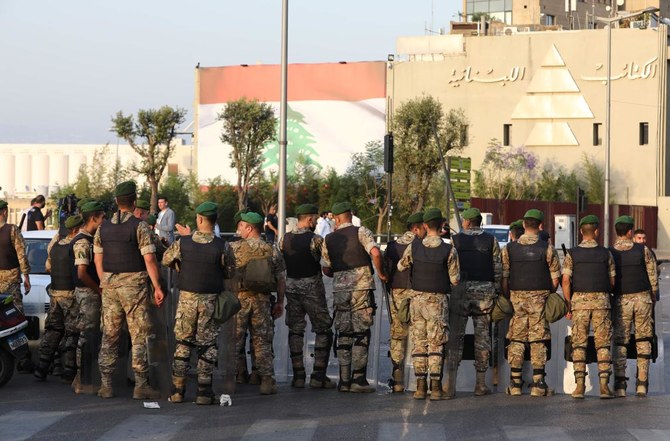
- Riot police fired tear gas at protesters, after Saturday’s attempt to reboot anti-government demonstrations quickly degenerated into rioting
- The Lebanese Army issued a statement vowing action against those who jeopardize the “state’s security”
Dubai Airport will return to full operational capacity within 24 hours, COO says
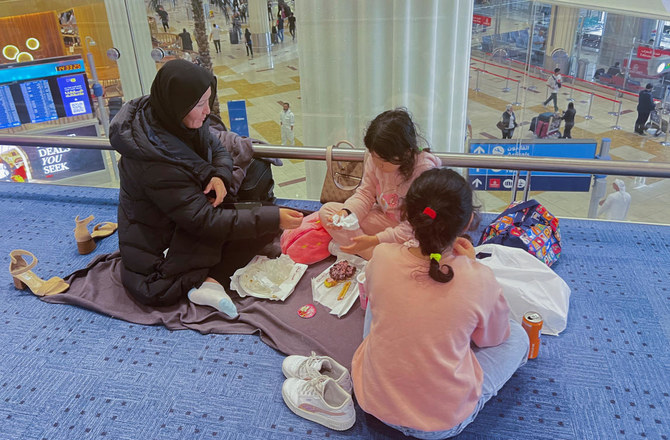
- The hub has struggled to clear a backlog of flights in the aftermath of heavy rain that swamped the United Arab Emirates on Tuesday
The hub has struggled to clear a backlog of flights in the aftermath of heavy rain that swamped the United Arab Emirates on Tuesday.
“Once operations are back to normal, we will assess the damages and would be able to give figure for the size of losses,” Al Joker told Al Arabiya TV in a televised interview.
British MPs urge government to designate IRGC a terror group
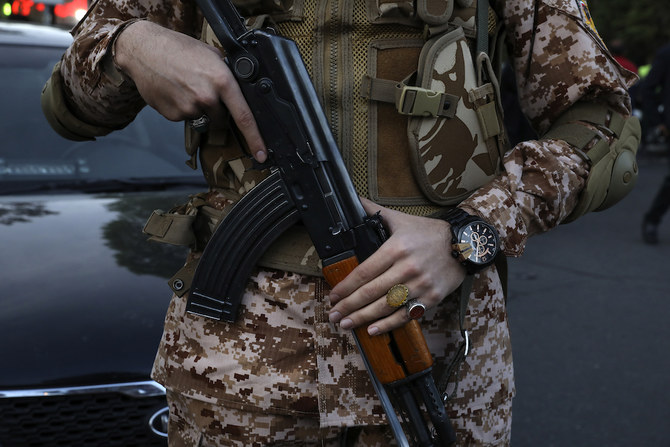
- Signatories to open letter say Iranian organization has ‘never posed a greater threat to UK’
- Proscription would put Islamic Revolutionary Guard Corps on par with Daesh, Al-Qaeda
LONDON: A cross-party group of more than 50 MPs and Lords peers in the UK have demanded that Iran’s Islamic Revolutionary Guard Corps be designated a terrorist organization.
The cross-party group, which includes former home secretaries Suella Braverman and Priti Patel, made the request in an open letter to The Times.
The IRGC is a key component of Iran’s military and power-projection capabilities. More than 125,000 personnel serve in its ranks, spread across wings including the Quds Force, the overseas element responsible for liaising with and supporting militias in Yemen, Lebanon, Iraq and Syria. In recent years, the IRGC has also built a relationship with Hamas in the Gaza Strip.
The open letter, signed by 134 people, follows last weekend’s Iranian attack on Israel, which signatories described as the “latest chapter of destructive terror by the IRGC.”
It says: “The government has combated extremism and terrorism by proscribing Hamas and Hezbollah but it is not enough.
“The IRGC is the primary source of ideological radicalisation, funding, equipment and training for these groups.
“The government must act against the root cause and proscribe the IRGC as a terrorist organisation.”
Iran’s attack was a response to Israel’s strike on its consulate in Damascus that killed 11 people, including senior commanders.
Former US President Donald Trump designated the IRGC as a terrorist organization in 2019, a year before the assassination of Qassem Soleimani, head of the Quds Force.
But the UK has been reluctant to follow the US measure for fear of breaking diplomatic communication channels with Tehran.
As part of sanctions on Iran targeting its nuclear program, however, the UK sanctioned the IRGC, freezing the assets of its members and implementing travel bans.
A terrorist designation in the UK would put the IRGC on par with Daesh and Al-Qaeda, and make it illegal to support the group, with a maximum penalty of 14 years’ imprisonment.
The 134 signatories said the IRGC has “never posed a greater threat to the UK,” accusing “thugs” belonging to the group of stabbing an Iranian dissident in London last month.
The letter was coordinated by the UK-Israel All Parliamentary Party Group, which includes former Immigration Minister Robert Jenrick.
Iran tells US it does not seek ‘expansion of tensions’
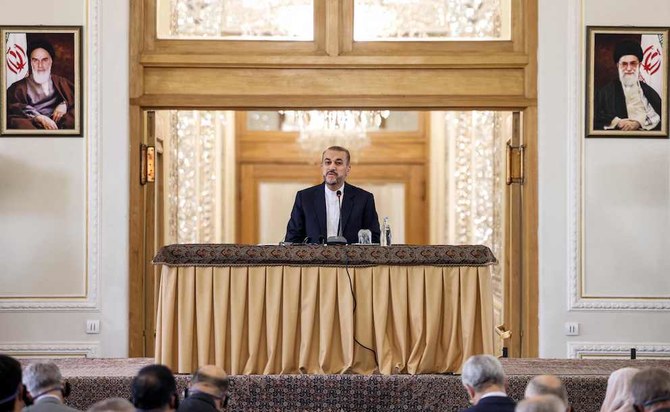
- Tehran carried out its first-ever direct attack on Israel, firing drones and missiles on the weekend
- Top envoy: Iran communicated with Washington ‘before and after’ launching its attack on Israel
TEHRAN: Iran’s top diplomat said Thursday his country has told the United States that it is not seeking escalation after an unprecedented attack on Israel.
The Islamic republic carried out its first-ever direct attack on Israel, firing drones and missiles on the weekend. The barrage — to which Israel’s army chief has vowed a response — was retaliation for an April 1 air strike on Tehran’s consulate in Damascus. Iran blamed Israel for the consular attack.
Foreign Minister Hossein Amir-Abdollahian, who is in New York to attend a UN Security Council meeting, said his country has “tried to tell the United States clearly” that Iran is “not looking for the expansion of tension in the region,” he said in a video posted by his ministry.
Iran and the United States have had no diplomatic relations since 1980, but neutral Switzerland represents Washington’s interests in Iran. Both the US and Iran have alluded to the Swiss role as an intermediary.
According to Amir-Abdollahian, Iran communicated with Washington “before and after” launching its attack on Israel.
Iran informed the United States that the decision by the Islamic Republic of Iran to “respond to the (Israel) regime is final,” and the matter concluded, he said.
Iran’s retaliation against Israel left a girl severely wounded but caused little damage. It followed the strike in Damascus that killed seven members of Iran’s Islamic Revolutionary Guards Corps, including two generals.
“Before the operation, we clearly told the American side that we will not target American bases and interests in the region,” Amir-Abdollahian said.
The Islamic republic has celebrated the attack as a success but President Ebrahim Raisi warned of “a fierce and severe response” to further “aggression” by Israel.
During his trip to New York, Amir-Abdollahian is set to meet United Nations Secretary-General Antonio Guterres and his counterparts from other countries.
The United States, Israel’s top ally, has said it would soon impose new sanctions on Iran’s missile and drone program following the strike on Israel, and said it expects allies to take parallel measures.
The US and other allies helped Israel intercept the Iranian strike.
Call to close UNRWA is attempt to strip Palestinians of refugee status — agency chief
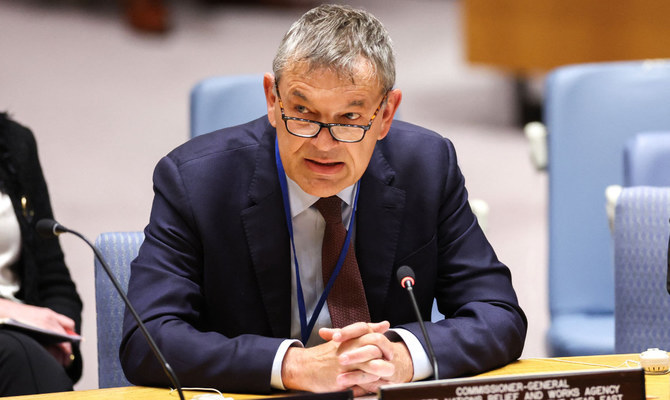
- Philippe Lazzarini tells Security Council demise of agency would also accelerate onset of famine in Gaza, and jeopardize transition from a ceasefire to recovery
- Meeting of the council requested by Jordan in response to long-running, continual attempts by Israel to force the agency out of Gaza and have it dismantled entirely
NEW YORK CITY: Disbanding the UN Relief and Works Agency for Palestine Refugees would have lasting repercussions for millions of Palestinians because it would result in them being stripped of their refugee status, the head of the agency told the Security Council on Wednesday.
Philippe Lazzarini warned it would also accelerate the onset of famine in Gaza, and jeopardize the eventual transition from a ceasefire to recovery by depriving a traumatized population of the essential services it requires.
Some of the ramifications would be long term, he added: “It will make impossible the formidable task of bringing half a million deeply distressed girls and boys back to learning. Failing to deliver on education will condemn an entire generation to despair, fueling anger, resentment, an endless cycle of violence.”
The meeting of the council was requested by Jordan in response to long-running, continual attempts by Israeli authorities to force the agency out of Gaza, and have it dismantled entirely.
It began with a minute’s silence in honor of the 178 UNRWA employees killed during the war in Gaza.
The agency has been facing great challenges not only in its efforts to provide humanitarian assistance to Palestinian civilians in Gaza, but also in ensuring it is able to continue its operations more generally.
More than 163 UNRWA installations in the Gaza Strip have been damaged during the war between Israel and Hamas, and only nine of its 24 healthcare facilities remain operational.
Meanwhile, the agency has been in a precarious financial position for some time, in part because of the decision by some major donor nations to suspend the funding they provide for the agency, which threatened to bring its operations grinding to a halt.
Several countries put their donations on hold after Israeli authorities alleged in January, without providing any supporting evidence, that 12 UNRWA workers had played a role in the Oct. 7 attacks by Hamas on Israel.
The agency terminated the contracts of the employees identified in the allegations, and the Office of Internal Oversight Services, the UN’s main investigative body, launched an inquiry at the request of UN Secretary-General Antonio Guterres.
Separately, the UN also ordered an independent review, led by the French former minister of foreign affairs, Catherine Colonna, of the steps the agency takes to uphold the principle of neutrality among its workers. The review group is expected to present its findings on April 20.
Lazzarini told council members on Wednesday that the real reason behind the Israeli calls for UNRWA to be closed down is not about its adherence to humanitarian principles, it is an attempt to end the refugee status of millions of Palestinians. The true aim is to change the long-standing political parameters for peace in the Occupied Palestinian Territories, he added.
“Accusations that UNRWA has deliberately perpetuated Palestinians’ refugee status are false and dishonest,” Lazzarini said. “The agency exists because a political solution does not. It exists in lieu of a state that can deliver critical public services.
“The international community has long attempted to contain, rather than resolve, the Israeli-Palestinian conflict. Lip service is paid to the two-state solution each time an escalation occurs, costing lives and hope.
“UNRWA was created 75 years ago as a temporary agency, a stop-gap measure, pending a political answer to the question of Palestine.
“If the international community truly commits to a political solution, UNRWA can retrieve its temporary nature by supporting a time-bomb transition, delivering education, primary healthcare and social support. It can do so until a Palestinian administration takes over the services.”
Russia’s permanent representative to the UN, Vasily Nebenzia, called on the Security Council to consider, as a matter of urgency, imposing sanctions on Israel for its failure to implement the council’s recent ceasefire resolution.
“Everyone knows about the facts, the unthinkable statistics, the number of people dead and those in need of urgent food and medical assistance, as well as reported cases of people dying of famine and dehydration, including minors,” he said.
“The IDF (Israel Defense Forces) is blocking half of humanitarian convoys, yet aid supplies are waiting at the border. We warned time and time again that in the absence of a lasting, sustainable ceasefire, which must be duly monitored by military observers, all of our humanitarian efforts are doomed.”
The US deputy ambassador to the UN, Robert Wood, said the conflict in Gaza has been one of the worst in recent memory in terms of the number of aid workers killed, with the total standing at more than 240 since Oct. 7.
“These incidents are unacceptable. Humanitarian personnel must be protected, full stop,” he said, and he expressed deep concern that “Israel has not done enough to protect humanitarian aid workers or civilians.”
Wood added: “UNRWA plays a crucial role throughout the region, contributes to stability of the region and supporting Palestinian refugees, to educating hundreds of thousands of students, to providing primary healthcare and critical relief and social services.
“UNRWA is the bedrock of support for the most vulnerable Palestinian refugees in Jordan, Lebanon, Syria and the West Bank. The United States supports this important work and emphasizes that it must continue uninterrupted.”
Call to close UNRWA is attempt to strip millions of Palestinians of refugee status: agency chief
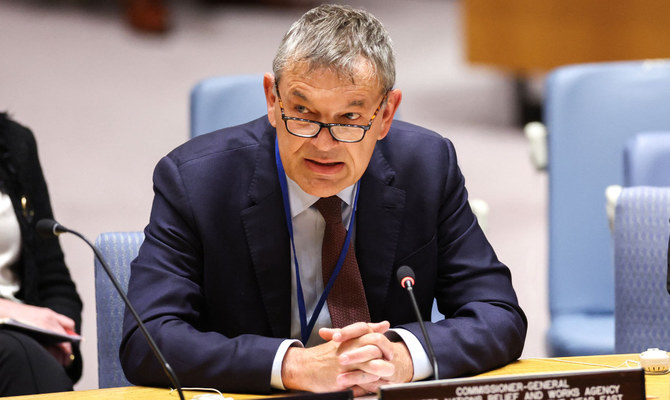
- Philippe Lazzarini tells Security Council demise of agency would also accelerate onset of famine in Gaza, and jeopardize transition from a ceasefire to recovery
- Meeting of the council requested by Jordan in response to long-running, continual attempts by Israel to force the agency out of Gaza and have it dismantled entirely
NEW YORK CITY: Disbanding the UN Relief and Works Agency for Palestine Refugees would have lasting repercussions for millions of Palestinians because it would result in them being stripped of their refugee status, the head of the agency told the Security Council on Wednesday.
Philippe Lazzarini warned it would also accelerate the onset of famine in Gaza, and jeopardize the eventual transition from a ceasefire to recovery by depriving a traumatized population of the essential services it requires.
Some of the ramifications would be long term, he added: “It will make impossible the formidable task of bringing half a million deeply distressed girls and boys back to learning. Failing to deliver on education will condemn an entire generation to despair, fueling anger, resentment, an endless cycle of violence.”
The meeting of the council was requested by Jordan in response to long-running, continual attempts by Israeli authorities to force the agency out of Gaza, and have it dismantled entirely.
It began with a minute’s silence in honor of the 178 UNRWA employees killed during the war in Gaza.
The agency has been facing great challenges not only in its efforts to provide humanitarian assistance to Palestinian civilians in Gaza, but also in ensuring it is able to continue its operations more generally.
More than 163 UNRWA installations in the Gaza Strip have been damaged during the war between Israel and Hamas, and only nine of its 24 healthcare facilities remain operational.
Meanwhile the agency has been in a precarious financial position for some time, in part because of the decision by some major donor nations to suspend the funding they provide for the agency, which threatened to bring its operations grinding to a halt.
Several countries put their donations on hold after Israeli authorities alleged in January, without providing any supporting evidence, that 12 UNRWA workers had played a role in the Oct. 7 attacks by Hamas on Israel.
The agency terminated the contracts of the employees identified in the allegations, and the Office of Internal Oversight Services, the UN’s main investigative body, launched an inquiry at the request of UN Secretary-General Antonio Guterres.
Separately, the UN also ordered an independent review, led by the French former minister of foreign affairs, Catherine Colonna, of the steps the agency takes to uphold the principle of neutrality among its workers. The review group is expected to present its findings on April 20.
Lazzarini told council members on Wednesday that the real reason behind the Israeli calls for UNRWA to be closed down is not about its adherence to humanitarian principles, it is an attempt to end the refugee status of millions of Palestinians. The true aim is to change the long-standing political parameters for peace in the Occupied Palestinian Territories, he added.
“Accusations that UNRWA has deliberately perpetuated Palestinians’ refugee status are false and dishonest,” Lazzarini said. “The agency exists because a political solution does not. It exists in lieu of a state that can deliver critical public services.
“The international community has long attempted to contain, rather than resolve, the Israeli-Palestinian conflict. Lip service is paid to the two-state solution each time an escalation occurs, costing lives and hope.
“UNRWA was created 75 years ago as a temporary agency, a stop-gap measure, pending a political answer to the question of Palestine.
“If the international community truly commits to a political solution, UNRWA can retrieve its temporary nature by supporting a time-bomb transition, delivering education, primary healthcare and social support. It can do so until a Palestinian administration takes over the services.”
Russia’s permanent representative to the UN, Vasily Nebenzia, called on the Security Council to consider, as a matter of urgency, imposing sanctions on Israel for its failure to implement the council’s recent ceasefire resolution.
“Everyone knows about the facts, the unthinkable statistics, the number of people dead and those in need of urgent food and medical assistance, as well as reported cases of people dying of famine and dehydration, including minors,” he said.
“The IDF (Israel Defense Forces) is blocking half of humanitarian convoys, yet aid supplies are waiting at the border. We warned time and time again that in the absence of a lasting, sustainable ceasefire, which must be duly monitored by military observers, all of our humanitarian efforts are doomed.”
The US deputy ambassador to the UN, Robert Wood, said the conflict in Gaza has been one of the worst in recent memory in terms of the number of aid workers killed, with the total standing at more than 240 since Oct. 7.
“These incidents are unacceptable. Humanitarian personnel must be protected, full stop,” he said, and he expressed deep concern that “Israel has not done enough to protect humanitarian aid workers or civilians.”
Wood added: “UNRWA plays a crucial role throughout the region, contributes to stability of the region and supporting Palestinian refugees, to educating hundreds of thousands of students, to providing primary healthcare and critical relief and social services.
“UNRWA is the bedrock of support for the most vulnerable Palestinian refugees in Jordan, Lebanon, Syria and the West Bank. The United States supports this important work and emphasizes that it must continue uninterrupted.”



